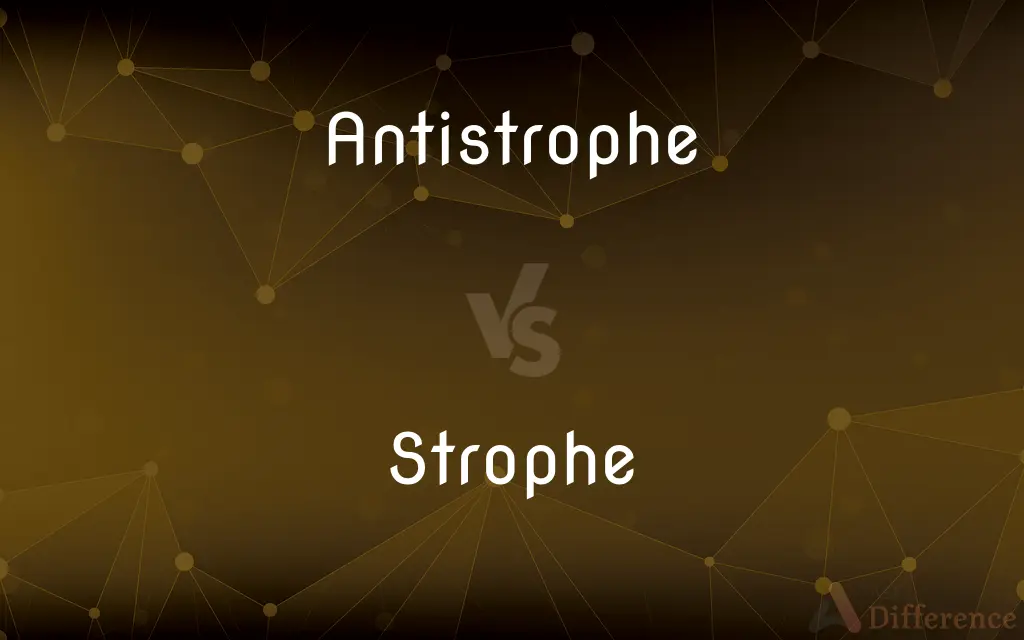Antistrophe vs. Strophe — What's the Difference?
By Tayyaba Rehman — Updated on December 25, 2023
In poetry and ancient Greek drama, a strophe is a stanza or turn of the chorus in one direction, while an antistrophe is the counterpart stanza or chorus's turn in the opposite direction.

Difference Between Antistrophe and Strophe
Table of Contents
ADVERTISEMENT
Key Differences
The strophe is the part of an ancient Greek choral ode sung by the chorus when moving from right to left. Antistrophe, in contrast, is the responding stanza sung while the chorus moves from left to right.
In strophe, the chorus might present one side of a debate or theme. The antistrophe, then, typically responds to or counters the strophe, often presenting an alternate perspective or argument.
The structure of strophe in Greek drama was often mirrored in the antistrophe in terms of meter and length, creating a balanced, rhythmic dialogue. This mirroring, however, does not mean the content was identical or opposite, but rather complementary or contrasting.
The function of a strophe in a choral ode is to introduce themes or set the scene. The antistrophe builds upon these themes, often deepening the narrative or emotional resonance.
The effective use of strophe and antistrophe represents a critical aspect of ancient Greek drama, showcasing the playwright's skill in creating symmetry and balance in lyrical expression and thematic exploration.
ADVERTISEMENT
Comparison Chart
Movement
Sung during the chorus's left to right movement
Sung during the chorus's right to left movement
Function in Drama
Often counters or responds to the strophe
Introduces themes or arguments
Structure
Mirrors the strophe in meter and length
Sets pattern in meter and length
Thematic Role
Builds upon or contrasts the themes of strophe
Sets scene or presents one side of a debate
Dramatic Importance
Provides balance and symmetry in dialogue
Establishes the rhythm and mood of the scene
Compare with Definitions
Antistrophe
Antistrophe is the part of an ancient Greek choral ode that responds to or counters the strophe.
The antistrophe provided a compelling counterargument to the strophe's claims.
Strophe
In poetry, strophe refers to the first section of a poem, setting the scene or theme.
The poem’s strophe introduced a haunting and melancholic mood.
Antistrophe
Antistrophe is the stanza sung while the chorus moves from left to right.
In the play, the chorus's movement during the antistrophe symbolized the thematic shift.
Strophe
Strophe is the part of an ancient Greek choral ode sung by the chorus as it moves from right to left.
The strophe set the tone for the drama with its lyrical and thematic depth.
Antistrophe
Antistrophe can signify the return movement in a ritual or dance.
The dance's antistrophe was marked by a gradual slowing of pace.
Strophe
Strophe can be a stanza in a poem that forms part of a larger structural division.
Each strophe in the poem presented a different aspect of the story.
Antistrophe
Antistrophe also represents a rhetorical device where the same word is repeated at the end of successive clauses.
The speaker used antistrophe effectively, ending each sentence with the same powerful word.
Strophe
In musical compositions, strophe refers to a repeated sequence of chords or melody.
The song's strophe was catchy and set the rhythm for the verses.
Antistrophe
In poetry, antistrophe refers to the second section of a poem that responds to the first.
The antistrophe in the poem echoed the structure of the strophe but with contrasting sentiments.
Strophe
Strophe is also used in the context of dance, referring to the initial movement or pattern.
The dance began with a complex strophe that was mirrored later in the performance.
Antistrophe
Antistrophe (Ancient Greek: ἀντιστροφή, "a turning back") is the portion of an ode sung by the chorus in its returning movement from west to east, in response to the strophe, which was sung from east to west.
Strophe
A strophe () is a poetic term originally referring to the first part of the ode in Ancient Greek tragedy, followed by the antistrophe and epode. The term has been extended to also mean a structural division of a poem containing stanzas of varying line length.
Antistrophe
The second stanza, and those like it, in a poem consisting of alternating stanzas in contrasting metrical form.
Strophe
The first of a pair of stanzas of alternating form on which the structure of a given poem is based.
Antistrophe
The second division of the triad of a Pindaric ode, having the same stanza form as the strophe.
Strophe
A stanza containing irregular lines.
Antistrophe
The choral movement in classical Greek drama in the opposite direction from that of the strophe.
Strophe
The first division of the triad constituting a section of a Pindaric ode.
Antistrophe
The part of a choral ode sung while this movement is executed.
Strophe
The first turning movement of the chorus from one side of the orchestra to the other in classical Greek drama.
Antistrophe
In Greek choruses and dances, the returning of the chorus, exactly answering to a previous strophe or movement from right to left.
Strophe
The part of a choral ode sung while this movement is executed.
Antistrophe
The lines of this part of the choral song.
Strophe
(prosody) A turn in verse, as from one metrical foot to another, or from one side of a chorus to the other.
Antistrophe
(rhetoric) The repetition of words in an inverse order.
Strophe
(prosody) The section of an ode that the chorus chants as it moves from right to left across the stage.
Antistrophe
(rhetoric) The repetition of a word or phrase at the end of successive clauses
Strophe
(prosody) A pair of stanzas of alternating form on which the structure of a given poem is based.
Antistrophe
The retort or turning of an adversary's plea against him.
Strophe
In Greek choruses and dances, the movement of the chorus while turning from the right to the left of the orchestra; hence, the strain, or part of the choral ode, sung during this movement. Also sometimes used of a stanza of modern verse. See the Note under Antistrophe.
Antistrophe
In Greek choruses and dances, the returning of the chorus, exactly answering to a previous strophe or movement from right to left. Hence: The lines of this part of the choral song.
It was customary, on some occasions, to dance round the altars whilst they sang the sacred hymns, which consisted of three stanzas or parts; the first of which, called strophe, was sung in turning from east to west; the other, named antistrophe, in returning from west to east; then they stood before the altar, and sang the epode, which was the last part of the song.
Strophe
One section of a lyric poem or choral ode in classical Greek drama
Antistrophe
The repetition of words in an inverse order; as, the master of the servant and the servant of the master.
Antistrophe
The section of a choral ode answering a previous strophe in classical Greek drama; the second of two metrically corresponding sections in a poem
Common Curiosities
What does strophe mean in the context of ancient drama?
Strophe in ancient drama refers to the part of a choral ode sung during the chorus’s movement from right to left, setting the scene or introducing themes.
Can antistrophe exist without a strophe?
Antistrophe typically pairs with a strophe, as it is meant to respond to or mirror the strophe’s themes and structure.
What is an antistrophe in Greek drama?
In Greek drama, an antistrophe is the part of a choral ode sung during the chorus’s movement from left to right, often responding to the strophe.
Is strophe always the first part of a choral ode?
Yes, in Greek choral odes, the strophe is typically the first part, followed by the antistrophe.
How do dancers interpret strophe and antistrophe?
In dance, strophe and antistrophe can refer to movements in different directions, symbolizing thematic or narrative shifts.
Are antistrophe and strophe used in modern poetry?
While rooted in ancient Greek drama, the concepts of antistrophe and strophe can be adapted in modern poetry and music.
How do antistrophe and strophe function together in a play?
Together, antistrophe and strophe create a balanced and rhythmic dialogue, with antistrophe responding to or contrasting with the strophe.
Do antistrophe and strophe have the same meter and length?
Typically, antistrophe mirrors the strophe in meter and length, creating a structural symmetry.
What role does strophe play in setting the mood of a play?
The strophe plays a crucial role in establishing the mood, rhythm, and thematic groundwork of a scene in a play.
Can the themes in strophe and antistrophe be contrasting?
Yes, often the antistrophe contrasts or deepens the themes introduced in the strophe.
Is antistrophe used in rhetorical speech?
Yes, antistrophe as a rhetorical device involves repeating the same word at the end of successive clauses for emphasis.
What is the significance of chorus movement in strophe and antistrophe?
The chorus movement in strophe (right to left) and antistrophe (left to right) often symbolizes different perspectives or thematic shifts.
How does antistrophe contribute to a poem's structure?
In a poem, antistrophe contributes by providing a structural and thematic counterpoint to the strophe.
Are antistrophe and strophe relevant in contemporary theater?
While rooted in ancient Greek drama, the concepts of strophe and antistrophe can still influence contemporary theater, particularly in poetic or musical elements.
Can strophe and antistrophe be found in music?
In music, strophe and antistrophe can refer to repeated sequences of melody or chords, often with variations or contrasts.
Share Your Discovery

Previous Comparison
Braided vs. Pigtail
Next Comparison
Friend vs. FellowAuthor Spotlight
Written by
Tayyaba RehmanTayyaba Rehman is a distinguished writer, currently serving as a primary contributor to askdifference.com. As a researcher in semantics and etymology, Tayyaba's passion for the complexity of languages and their distinctions has found a perfect home on the platform. Tayyaba delves into the intricacies of language, distinguishing between commonly confused words and phrases, thereby providing clarity for readers worldwide.













































